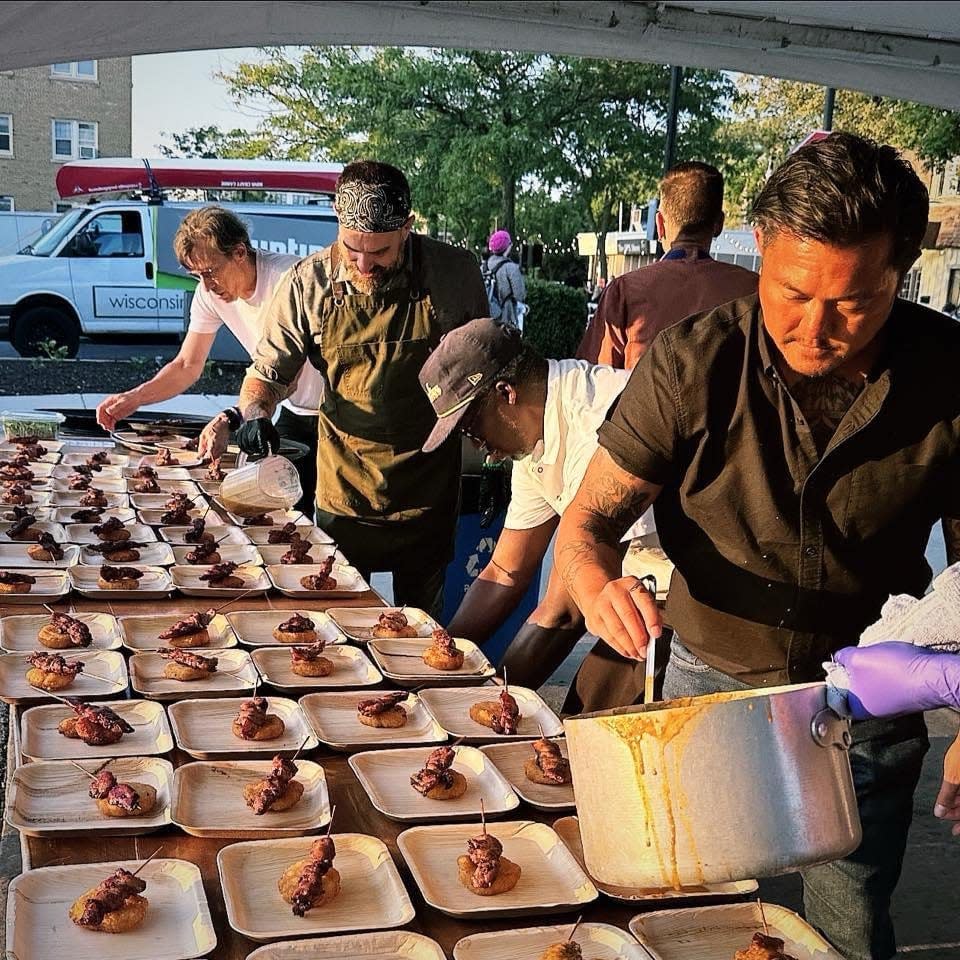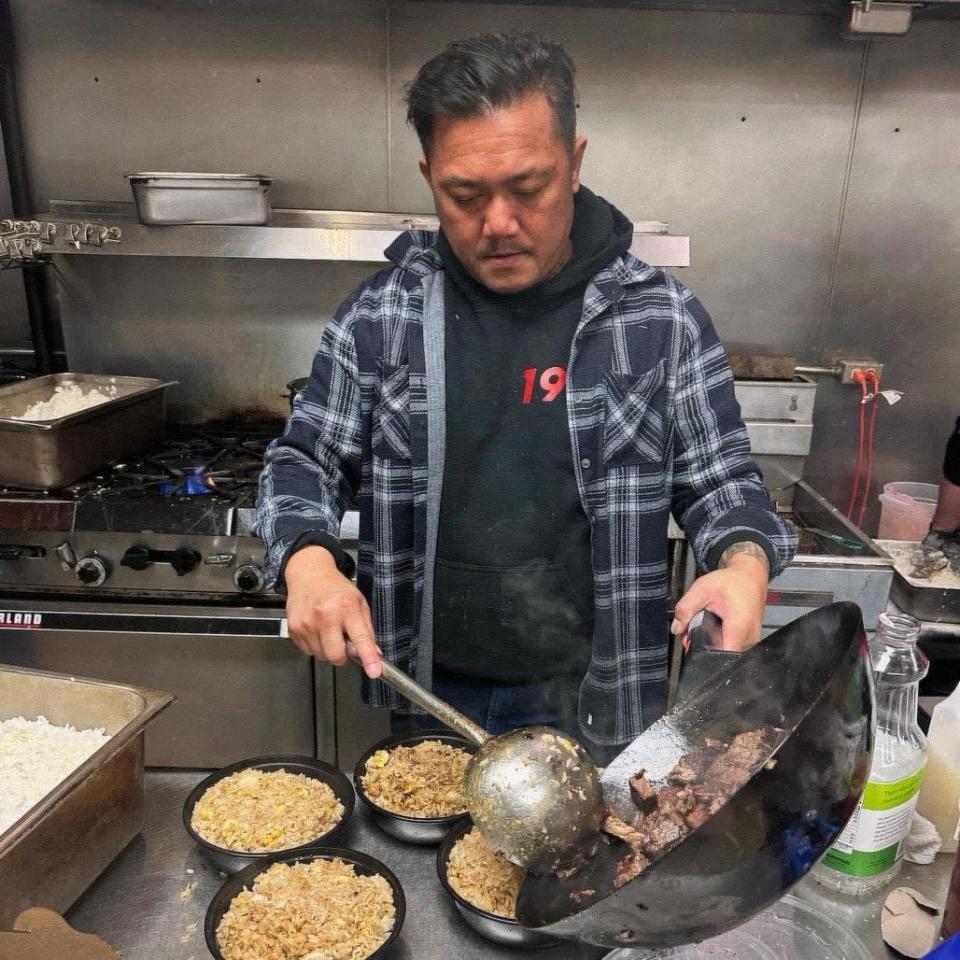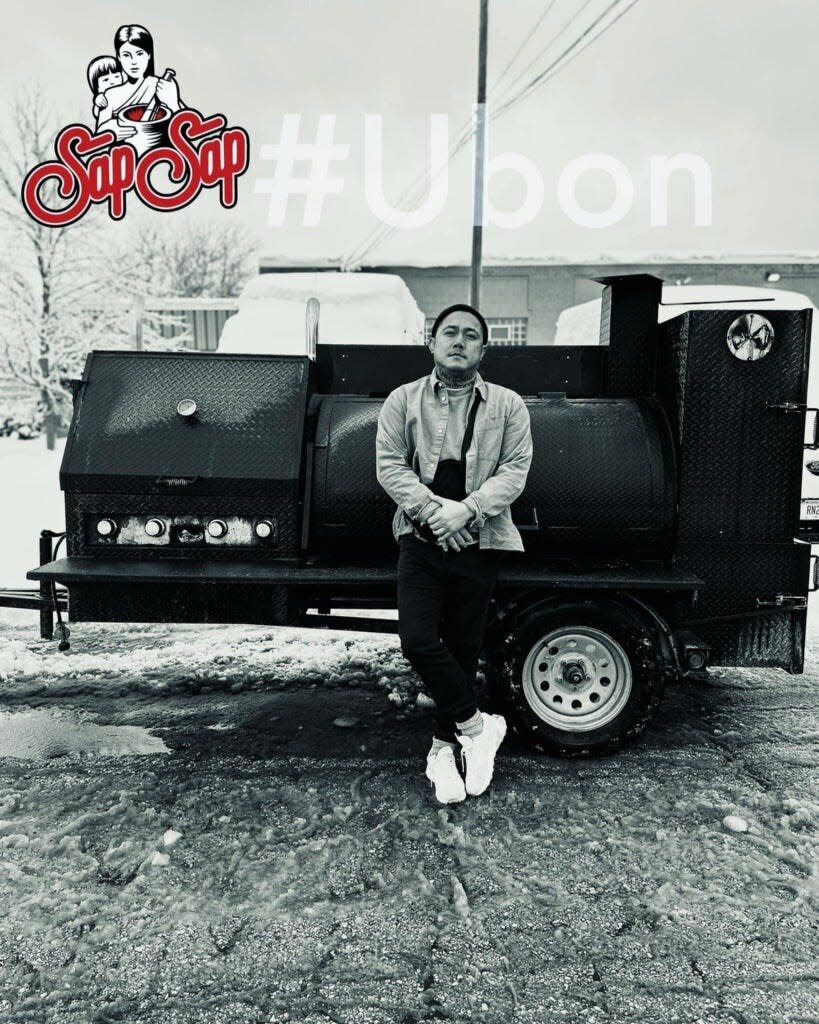With Sap Sap: Ubon, Alex Hanesakda serves Laotian barbecue and storytelling

After leaving Laos, Alex Hanesakda’s family lived in Ubon refugee camp in Thailand, then made their way to Wisconsin. Hanesakda was a toddler. He doesn’t remember the camp, but it continues to play a significant role in his life.
When language was a barrier, his mother used food to connect. She became known for her egg rolls, and in turn they inspired Hanesakda to open his Sap Sap food business nearly a decade ago.
Now, it’s part of the inspiration behind his newest pop-up series Sap Sap: Ubon, which launched at Amorphic Beer, 3700 N. Fratney St., in February. In April he will announce a full schedule for the summer.
Hanesakda closed his Sap Sap restaurant in Racine in August and took time to think about what makes him happy. He realized it isn’t just the food, it’s connections and storytelling that drive him.
That’s the idea behind Sap Sap: Ubon pop-ups, catering and events. He has the smoker, his recipes, and a willingness to travel around the state. Melding where he comes from and where he is today, every dish gives a nod to his family roots in Laos, his mother’s cooking, and ingredients and techniques adopted working with other chefs over the years. It all begins with grilled meats and sticky rice, his menu staples and most popular dishes.
Hanesakda is also launching a compostable plate business, Bai Jai, using leaves from Laos. Plans include 5% of the profit going back to a Wausau area nonprofit, We Help War Victims. Founded by educator Jim Harris, the group works to remove bombs from Laos. Hanesakda, who plans his first visit Laos this summer to see the group’s work, intends to serve his barbecue on the compostable plates.
He talked from his home in St. Francis while planning his pop-up schedule.
The story of Sap Sap is more than food
The Sap Sap story extends from the war in Vietnam. We were refugees that went to Thailand. My dad fought for the Americans. My mom and dad escaped to a refugee camp, Ubon, and a few other scattered ones were around. The inspiration was to share that story, where we came from, where we are, and how we got here. None of this information was in the textbooks when I was growing up. It is crazy, because Laos was one of the largest populations and we saw this influx of southeast Asians coming to the Midwest, Wisconsin, California.
I was like 2 when I came here. I don't remember the refugee camp. My sisters do. I remember feeling different. We were one of the few Laotian families in Burlington. My mother would make these egg rolls. I saw their power. She couldn't speak English, but I saw the offering of food being a connector to our neighbors. Why are you here? Where do you come from? We told our story through food.
A meal from mom led to barbecue business
Fast forward to my early 30s, I had the idea to manufacture my mom's egg rolls. That was humbling. You need a lot of money. I don't have that. So I went to a small purveyor in East Troy, Hometown Sausage Kitchen. I did my first pop up and it snowballed. Every event monthly was selling out. We got very close to opening a spot in Crossroads Collective pre-Covid.

When Covid hit, I had no idea what I was going to do. We had a rental kitchen in Racine, where we lived. I had the idea to do curbside pick up. That took off …. Then I had the bright idea to get into the lucrative restaurant business in Racine. That was very humbling. Two years of the restaurant, I didn't lose my passion, but it wasn’t working. I felt like we weren’t getting our message across through food. We closed the restaurant.
Back to basics with barbecue
I moved up to Milwaukee with my partner. Lao barbecue stuck in my head. Everyone loves our grilled meats. There is no representation for Southeastern Asian barbecue in Wisconsin. Me personally, I love grilled meat, smoky meat.
Barbecue is very universal, using smoke as the only tool you have to make food. I have this smoker, and we’re not stuck in one place. We’re known for our Lao barbecue. We were on Wisconsin Foodie for it. Let's go back to the basics and what Sap Sap was about: storytelling through food. It is called Sap Sap: Ubon. Ubon is the refugee camp where I was born. This is an homage. Ubon is actually the name of my smoker. The smoker came with a burner. That’s what we use for our fried rice. Instead of serving the brisket with mac’n cheese or coleslaw, we serve it with fried rice.
What to know about Laosand Laotian food
I will try to keep it as simple as possible. Laos is the country. Laotian is all things Laos. There are so many ethnicities in Laos. Lao food I feel has been very underrepresented, and culturally appropriated by the Thais, because a lot of Thai dishes are Lao dishes. … When I say Lao food, people are what is that? This is the food that other ethnicities take credit for when it is our dish. When I have a platform to explain this confusion I think that is important. We are the Lao people of Laos, the Hmong people of Laos, and Khmu people of Laos.
Defining his culinary style
I grew up learning certain techniques from my parents, but I also worked with CIA French chefs. Both apply. I have learned from them. They learn from me. My approach to Lao food is let’s give them the flavors and apply to what is common here in the Midwest. Hence the brisket fried rice. We prepare some meat and serve with sticky rice, merge both worlds. I take what I feel is delicious but common to the Western palate. I would be out of business if I did only hardcore Laos food.
A favorite is coming back soon
Yes, we’re bringing back the sausages this summer. We have a co-packer, we’re working with Hometown Sausage in East Troy again.
The one ingredient he can't live without
Definitely lemongrass. I use it in a lot of things.
The most requested meals
Everyone loves the smoked brisket and fried rice, it is common and relatable. Yet at the restaurant people loved my chicken sandwich, a fusion one. It is always the grilled meats with sticky rice or smoked brisket fried rice that are the most popular.
Then the sauces are meant to be dipped with sticky rice with your meal. They’re spicy. They're tangy. We’re doing two. One is a roasted chile one with more depth, and the other is a fresh chile with fish sauce and ginger. The sauces won’t change, these are staples on our menu. They’re meant to complement the sticky rice and the smokiness of the meats.

Leaves from Laos bring him to next stage
Our whole model has been about social impact. How can we help? It is ultimately to tell the story of what happened in Laos. We work with an organization, We Help War Victims. A former principal from Wausau, he saw the influx (of refugees) there and started the organization to support and remove the ordnances in Laos.
Then my partner Tom, he has a manufacturing business and he found the perfect manufacturer to do these plates. They use palm leaves that fall off the trees in southeast Asia. You’re not knocking down trees. You're molding the leaves into compostable plates. The business is called Bai Jai. Bai is the leaf, jai is the heart. It is falling leaves to help remove fallen bombs. Simple as that.
I think if you have a platform, you should do good with it. The focus is to highlight what happened in Laos. There are still bombs there. Let’s bring awareness to that. I have not been there. We plan to go this summer and document Jim’s work (with We Help War Victims). We’ll visit the place that is making our molded plates and of course try the food there. The focus is what happened there, why refugees are here, and what we bring. It is about learning and serving each other.
Fork. Spoon. Life. explores the everyday relationship that local notables have with food. To suggest future personalities to profile, email clewis@journalsentinel.com.
This article originally appeared on Milwaukee Journal Sentinel: Sap Sap: Ubon pop-up features Laotian barbecue with a purpose

